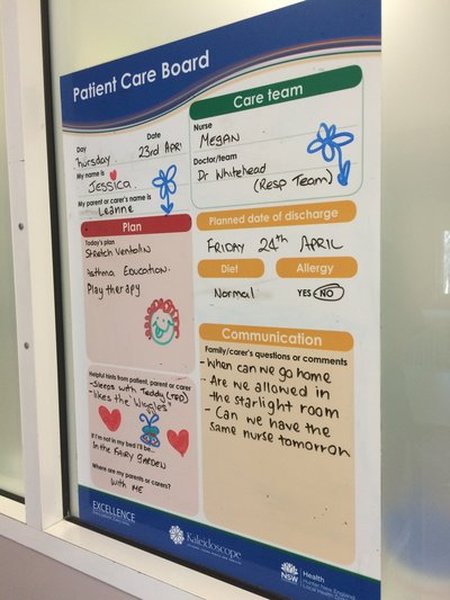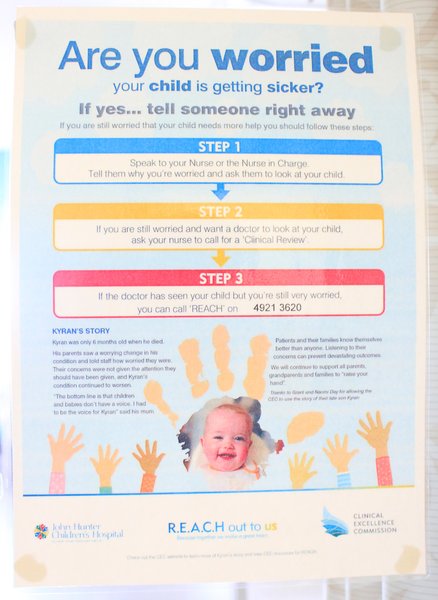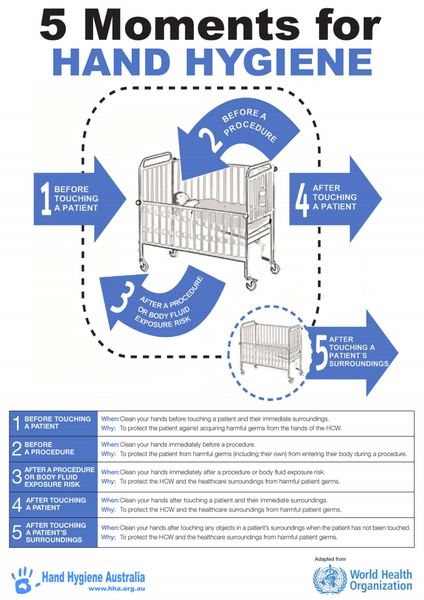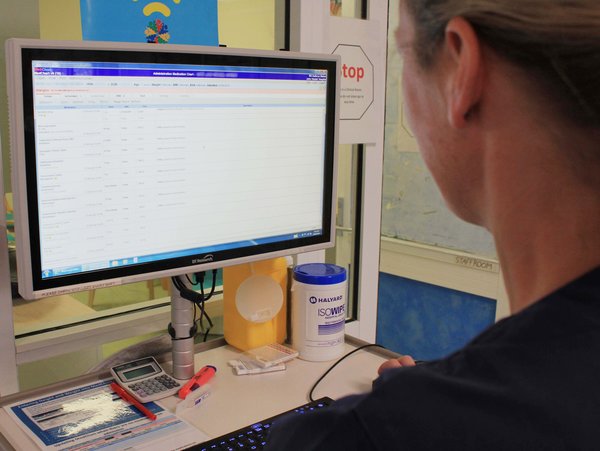Admission to the Children's Hospital
Staying overnight or for an extended time can be both stressful and scary for children, young people and their families. At John Hunter Children's Hospital we do everything possible to ensure you are prepared and your stay is as comfortable as possible.
To prepare your child and your family for an admission to the Children's Hospital, please read the information below.
What you need to know during an admission
Help us get to know your child
- Name and Age
- Who is in their family or lives at home?
- What they like to do or play?
- Are there special routines for sleep?
- Each child develops differently:
- How do they communicate best?
- Do they need help with eating?
- Do they need help with toileting?
- How do they move around?
During the hospital stay, staff will be part of your team.
We are there to answer your questions and monitor the progress of your child.
Each bed space has a communication board for you and the staff to use.
The Young Person's Safety Briefing (Video)
We are committed to keeping our patients safe by doing everything we can to minimise the risk of injury and infection, but we need you’re help!
Watch the video below to find out how be a safety super hero and stay safe while you’re in hospital.
How to make your child feel as comfortable as possible during their stay
- One adult is welcome to stay
- Bring your child's favourite toy, games or activities from home (colouring-in, card or board games or books)
- If your child requires an uncomfortable procedure, decide whether you want to be present to support your child.
- Be calm yourself
- Validate your child's worries
- Use distraction for example singing a favourite song or reading a favourite picture book
How you can REACH out if you are worried about your child's care
We know you know your child best.
REACH is an easy to use system to raise concerns if you notice a worrying change in your condition or that of your child.
We encourage you to first raise your concerns directly with your child's nurse or doctor. If you remain worried after speaking with your nurse or doctor, REACH provides you with more options to escalate your concerns further.
The REACH number for John Hunter Children's Hospital is 49213620. An SMS notification will also be sent to the primary contact on file for your child following admission, advising how you can access REACH.
Cleaning your hands
Germs are invisible and hygiene is the most important factor in stopping you or your child catching another infection in hospital.
- Please provide care only to YOUR child.
- All staff must gel or wash their hands in front of you. If you do not see them do this, please remind them.
Gel or wash your hands:
- When you enter the ward
- Before and after you touch your child
- Before and after using common areas (kitchen, play areas, Book Nook, Starlight Room, Ronald McDonald Family Room)
- After going to the toilet and after blowing your nose
Special infection control measures apply to children and families with certain illnesses - your nurse will explain if special procedures, masks, gowns or gloves are needed.
Ensuring your child's medication is right
To prevent medication errors:
- If you can, bring your child's current medications with you to hospital, or a list from their doctor
- Tell the doctor and nurse:
- that your child takes regular medicine
- if your child is allergic to a medicine, food or something else
- Ask the doctor or nurse:
- what medication your child is being given and what it's for
Health care staff must always check the child's name band and medication record BEFORE giving any medicine. If you don't see this happen, PLEASE ASK staff to double check before the medicine is given to your child.
John Hunter Children's Hospital uses MedChart, which provides an end-to-end electronic medication management solution, helping reduce clinical risk and improve medication safety.
Prevent your child from falling and bed entrapment in hospital
To prevent children falling in hospital:
- Put the cot sides or bed rails up and don't co-sleep
- Put water and toys in easy reach of older children
- Support a child's walking when drowsy (medication or operations)
- Wear non-slip shoes and clothing that doesn't trip the child
Download falls prevention fact sheet and entrapment prevention fact sheet.
Promoting healthy skin
To prevent skin pressure injuries:
It's not just elderly adults who can have pressure injuries. Children can have injuries due to sustained pressure of:
- Splints, plaster or braces
- Nappy
- Medical devices e.g. tubes, masks, drains and cannulas (drips)
- Or from lying in bed on:
- Back of head or ears
- Spine, shoulder blades or coccyx
- Heels
Staff will assessyour child's risk of pressure injury within 8 hours of admission and make care plans to decrease the risk. Highest risks are preterm infants, very sick children and long admissions.
Parents and carers can help us by:
- Alert staff if you notice red blistering or broken skin, or pain, irritability or an unpleasant smell
- Keep your child's skin clean and dry, including changing their nappy as soon as it is wet or dirty
- Use skin-friendly cleanser and moisturiser
For further information view the Skin Pressure Injuries fact sheet.
Food and nutrition for patients in hospital
During your child's stay in hospital they will be offered a range of foods, including hots meals, soups, salads and sandwiches, along with hot and cold drinks.
For some children a special diet may be required while in hospital due to their medical condition or for a procedure they require. The appropriate meal will be provided to children who have these requirements.
For further information on hospital nutrition visit:
Ward information and virtual tours
John Hunter Children's Hospital has three wards and a NICU. For information on the NICU, please visit the NICU page.
The three wards include:
- Ward J1 - Children's Surgical and Oncology Ward
- Ward J2 - Adolescent Ward, Day Stay and Sleep Unit
- Ward H1 - Children's Medical Ward
General hospital information
Accomodation
One ADULT family member can stay overnight.
ATM
There are two in the hospital, each located at both hospital entrances (Emergency Department and Royal Newcastle)
Bedtime
Pull the curtains open so that night staff can better observe your child.
Children have varying sleep times, but in order to cater for all - turn off or silence all electronic devices, TV and mobile phones at 8.30pm (9.30pm on J2 - Adolescent Ward).
Conduct
You and your child have the following rights:
- Safe and high quality care
- You will be treated with respect and confidentiality
- You will be informed about the care and options with clear communication
- Your questions and concerns will be listened to and answered
- Your General Practioner will receive a discharge summary about the admission and subsequent health needs.
Our staff expect to be treated the same. Swearing, threats, vilence or drug use will NOT be tolerated.
Food and drinks
Patients will be provided meals, including morning and afternoon tea.
Each ward has a kitchen for parents and carers' use. There are a range of food outlets along the main corridor on level two of the hospital, especially up towards the Royal Newcastle Centre. The Kookaburra Cafeteria is adjacent to H1 (cash only).
Activities and entertainment
- Book Nook - the Children's Hospital library (located on H1)
- Fairy Garden - an outdoor garden designed for kids (located adjacent to the J1 entry)
- Ronald McDonald Family Room - a place for parents to relax and rest (located adjacent to the J1 entry)
- Schoolroom - a public school right here in the hospital (located between H1 and J1, entry from both)
- Starlight Express Room - a medical free haven for sick kids (located adjacent to the J2 entry)
WiFi
The Children's Hospital has free gurst WiFi. Check out the WiFi page for how to connect.
Telephones
There is a public telephone at the main entrance to the hospital. All mobile phone should be switched to silent between 8.30pm - 8am.
Television
Television is available to patients free of charge.
Starlight TV channels are 100, 101 and 102. Call 55336 to request a film or to take part in the Starlight game shows. A list of films is available from Starlight.
Visiting hours
Parents are welcome 24 hours per day.
Rest time is 1-3pm and 8pm - 10am.
Visitors are welcome 10am - 1pm and 3pm - 8pm. Visitors who are unwell are advised to wear a mask or delay their visit until they are well.
Tour Ward J1 (Oncology/Surgical)
Ward J1 ward cares for up to 19 children aged 0-18 years, treating a variety of surgical and oncological problems. The ward consists of two four bed rooms and 11 single rooms.
Tour Ward J2 (Adolescent/Day Stay/Sleep)
Ward J2 is divided into three sections - Adolescents (J2A), the Day Stay Unit (J2DS) and the Sleep Unit.
Ward J2A is a 12 bed ward for young people over the age of 12. Patients receive care from a wide range of surgical and medical teams including respiratory, endocrine, neurology, general medicine orthopaedics, and general surgery. We aim to provide a safe and friendly environment for adolescent patients and their families, which is focused towards meeting their specialised needs. Patients are admitted to J2A through John Hunter Hospital Emergency Department, Outpatient clinics, direct from private specialist rooms or are transferred from another Hospital.
Ward J2DS is a 14 bed Day Stay Unit for children up to 18 years of age. Patients will be admitted to day stay for planned, day only medical admissions not requiring an overnight stay. All planned surgical admissions will be admitted to JHCH through J2DS prior to theatre and either return to Day stay post theatre if you are a day only admission or progress to one of the other paediatric wards if you require an over night stay or longer. All patients coming to J2DS are booked via admissions or via our ward clerk on J2 during working hours.
The Sleep Unit operates Monday to Thursday from 3pm until 7am the following morning. The sleep unit provides care for children up to 18 years of age. All patients coming to the Paediatric Sleep Unit will come through Paediatric sleep clinic where you will have been seen by one of the paediatric respiratory consultants.
Tour Ward H1 (Children's Medical)
Ward H1 is a 24 bed General Medical unit catering for patients aged from birth to 18 years old, requiring care from many different specialties. Specialities include General medicine, Respiratory, Neurology, Endocrine, Gastroenterology and Infectious Diseases.




